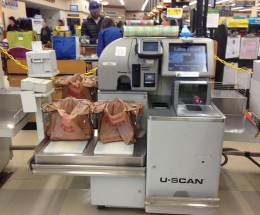Scan and Bag Your Own vs. A Real Person

Supermarket checkout — a low-wage job that doesn’t require much training — sounds like it should be similarly vulnerable to robotic invasion. But it turns out that checking out groceries requires just enough mental-processing skills to be a prohibitive challenge for computers. In that way, supermarket checkout represents a class of jobs that computers can’t yet match because, for now, they’re just not very good substituting key human abilities.
What’s so cognitively demanding about supermarket checkout? I spoke to several former checkout people, and they all pointed to the same skill: Identifying fruits and vegetables. Some supermarket produce is tagged with small stickers carrying product-lookup codes, but a lot of stuff isn’t. It’s the human checker’s job to tell the difference between green leaf lettuce and green bell peppers, and then to remember the proper code.
“It took me about three or four weeks to get to the point where I wouldn’t have to look up most items that came by,” said Sam Orme, a 30-year-old grad student who worked as a checker when he was a teenager.
Farhad Manjoo, formerly of Slate (his last post there was about how men should wear makeup) is now at the Wall Street Journal, and he writes about how robots and computers have yet to take over the low-wage job of the grocery cashier, noting that self-checkout machines haven’t matched the efficiency of hot-blooded cashiers trained to do their jobs. This is due to, of course, human error — we don’t know the codes for produce, and we’re not sure what to do if we accidentally do something like scan an item twice. There is also some robotic error at play (“the weight inside the bag is not correct” is something I’ve heard a few times despite me not doing anything). The machines also require supervision. I’ll choose the self-checkout lane if it’s available and I’m only buying a few things, but I’ll choose a real cashier for all other purchases most times.
Photo: Ethan226
Support The Billfold
The Billfold continues to exist thanks to support from our readers. Help us continue to do our work by making a monthly pledge on Patreon or a one-time-only contribution through PayPal.
Comments